-
Car Reviews
- Car News
-
Car Comparisons
Latest comparisons
- Chasing Deals
Lusting after a turbo-diesel, seven-seat Hyundai Santa Fe? This could be your last chance to get in one before the new model arrives
The Hyundai Santa Fe Active 2.2D is big on grunt. It offers plenty of space, too, especially for its size. It’s great for light to medium towing and it also packs a value punch, even if it’s not without its flaws and is far from the best SUV in its class.
With origins dating back to 2018, the current, fourth-generation Santa Fe is available in Australia in four grades and with three powertrain options, ranging from $46,050 for the base, front-drive petrol V6 to $69,550 for the hybrid, four-cylinder Highlander (all prices before on-road costs).
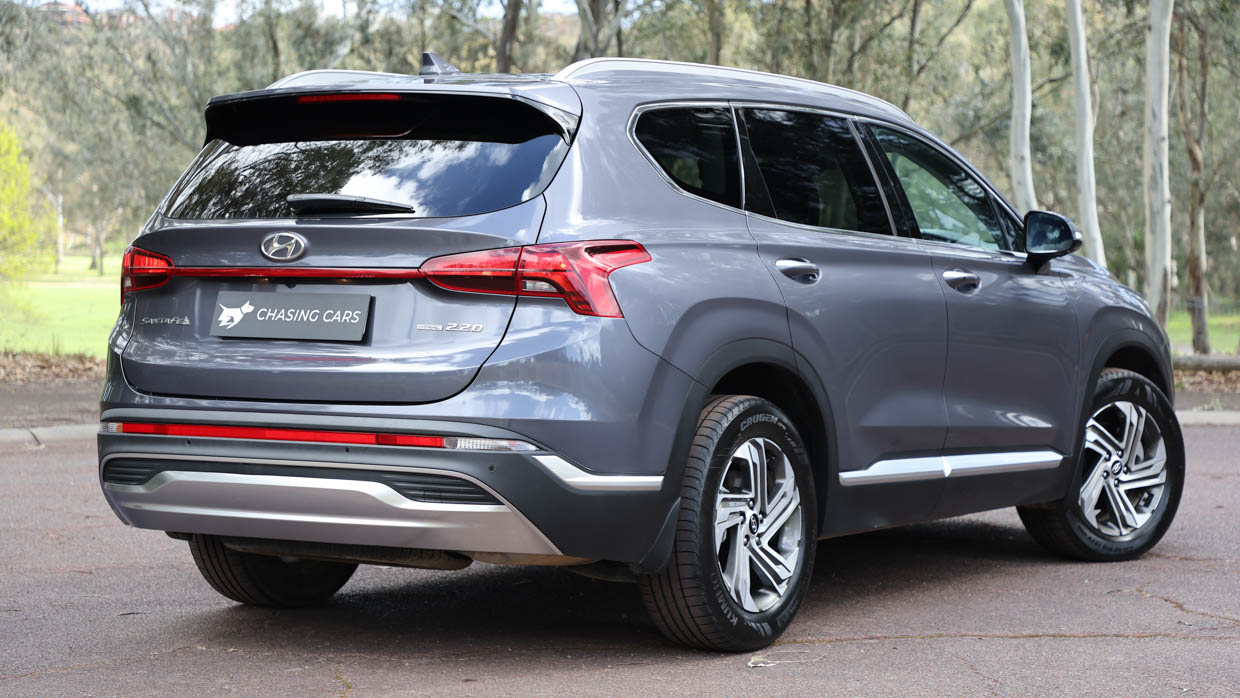
Today we’re testing the $53,750 Active, the next grade up from the base model and with a poky 148kW and 440Nm turbo-diesel 2.2-litre four-cylinder and all-wheel drive.
It has an eight-speed dual-clutch automatic where other Santa Fes use torque converter transmissions. The Santa Fe Active is a seven-seater.
The Santa Fe competes against vehicles such as the Kia Sorento and Toyota Kluger in the large SUV segment. The Sorento, which shares the same platform and general underpinnings as the Santa Fe, outsells both.
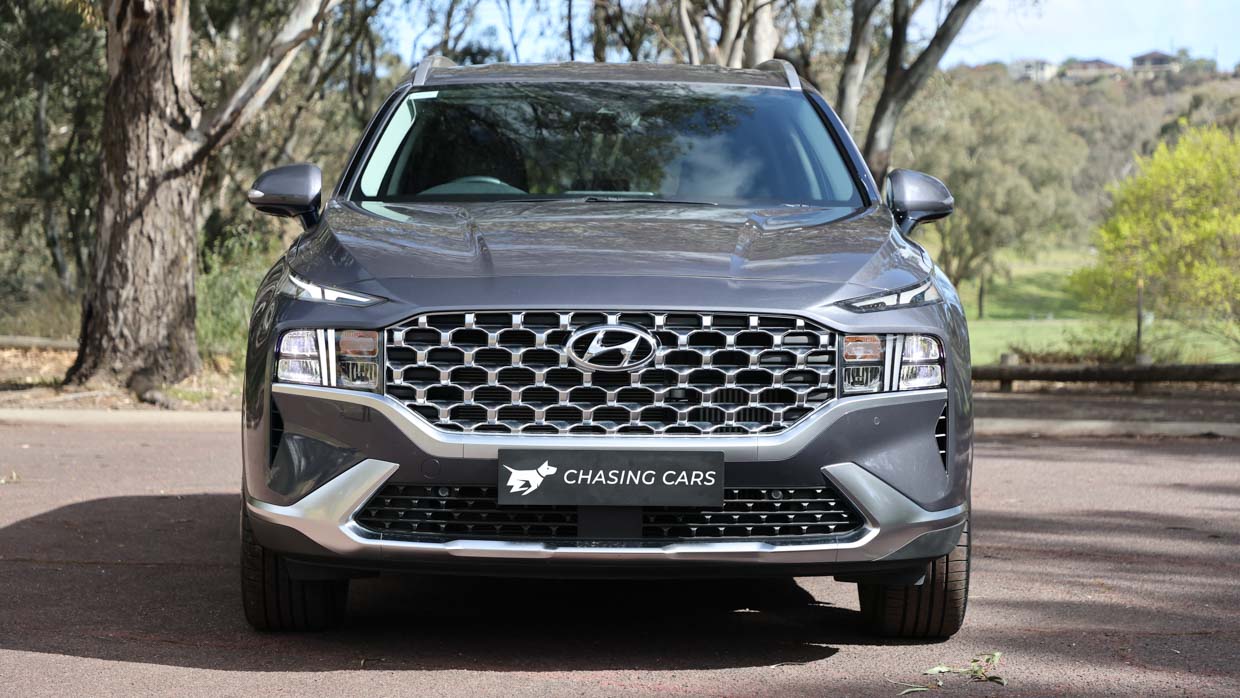
The Toyota Prado and Ford Everest are currently the best-sellers in this segment, however while they dwarf the Hyundai, Kia and Kluger for size, their ladder-chassis constructions make them cruder to drive.
A brand-new, fifth-generation Santa Fe is due in Australia in 2024, bigger dimensionally, with more technology and boxy, ostentatious styling. Hyundai has not detailed any diesel engine option, meaning this could be your last chance to get a Santa Fe with an oil-burning powertrain.
At $53,750 before on-road costs, the Santa Fe Active is a lot of car for the money, with more power and torque than many owners might strictly ever need, all-wheel drive with reasonable off-roading capability, a big boot and seating for seven.
The Active commands a $4200 premium over the base model sharing the same 2.2-litre turbodiesel powertrain.
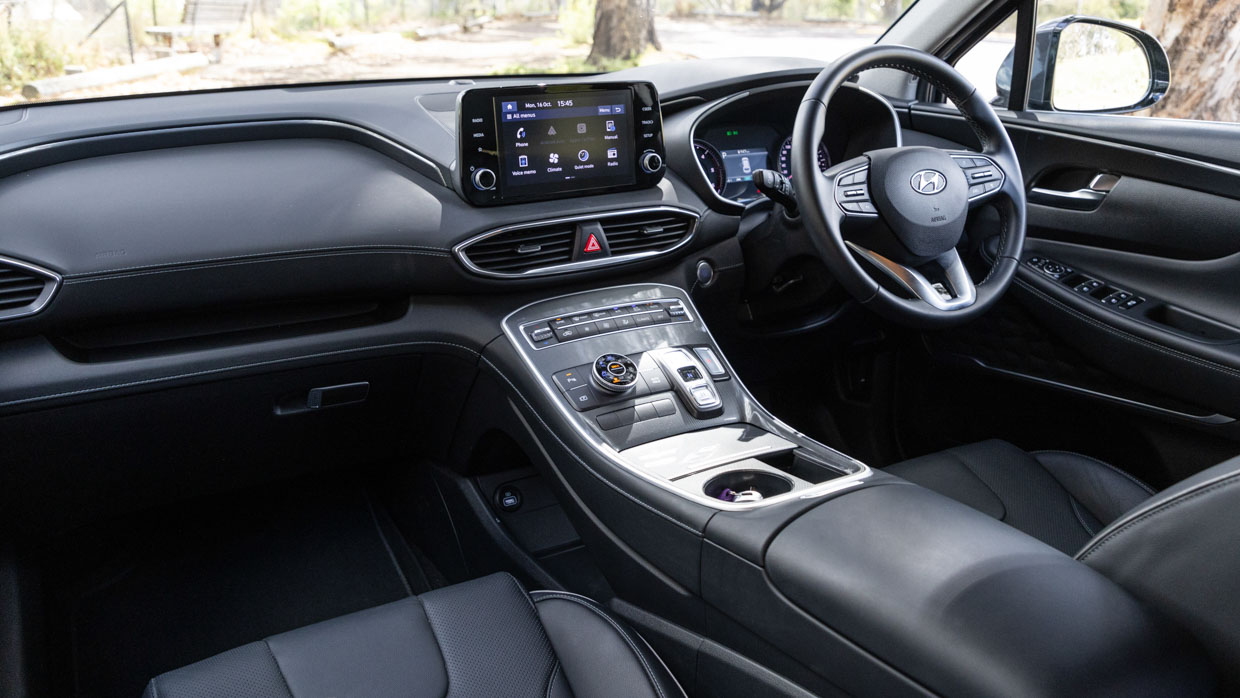
That outlay grants much nicer leather-appointed seats (over the base model’s cloth trim), front parking sensors, bigger 18-inch wheels (versus 17s), rain-sensing wipers, smart key with push-button start (versus an old-school key and barrel), tinted rear windows, electric-folding side mirrors, dual-zone climate control and some other minor bits and pieces. It’s money well spent.
While you get plenty for your dough, compared to higher grades – the luxe Highlander especially – the Active is still a bit basic. The front seats require essentially fully manual adjustment, there’s no sunroof, no powered tailgate and no heated seats, and you also get smaller infotainment and cluster digital displays.
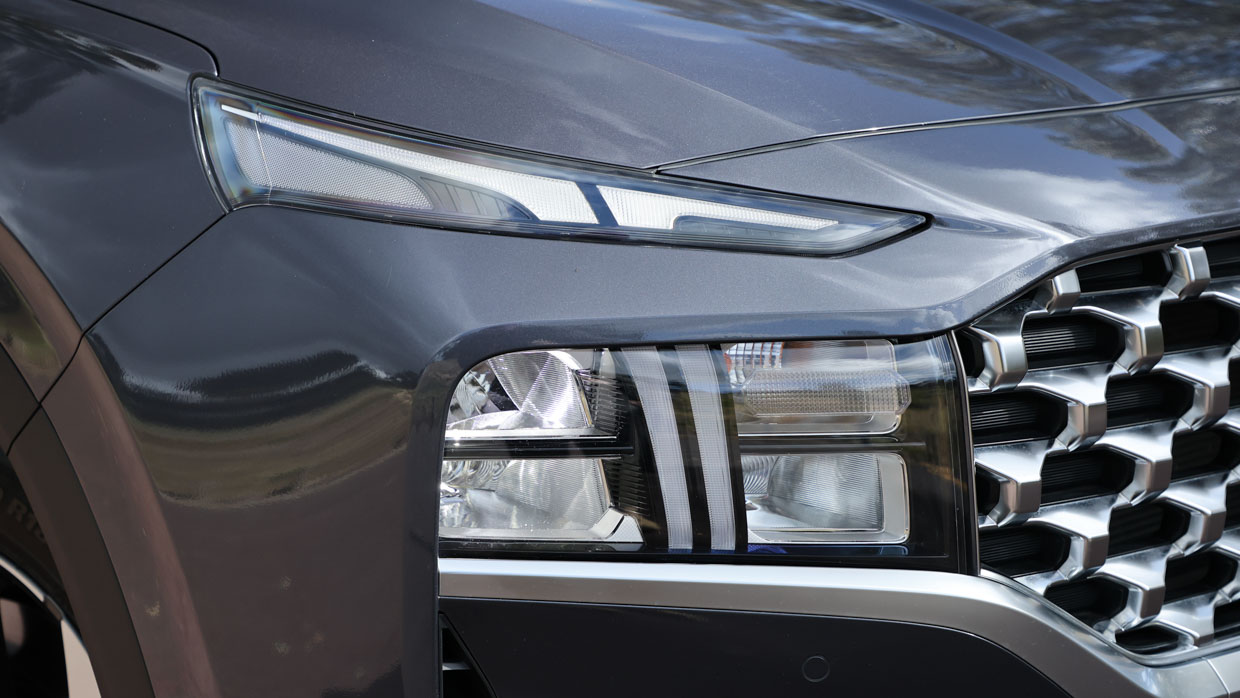
Santa Fe Active standard equipment highlights:
The only factory option is premium paint at $695.
The Santa Fe Active 2.2D is an effortless and easy SUV to drive, and one that doesn’t feel too big. It has a satisfying amount of power and torque, and boasts good levels of refinement. That’s even if, in many regards, it’s far from the best in its class, especially as newer models enter the market.
The engine is a highlight of the entire car. It’s beautifully smooth and offers great performance while boasting a lovely, mature diesel engine note that isn’t too loud.
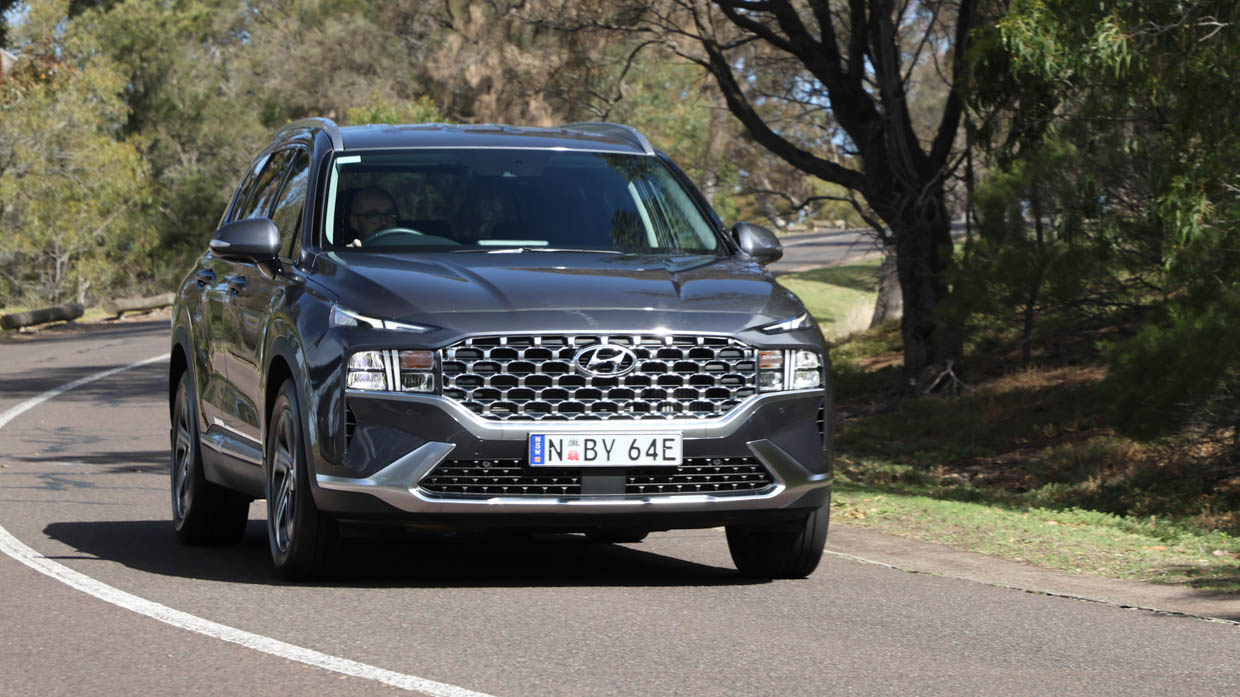
We also enjoy the standard shift-by-wire buttons for the transmission, doing away with the clumsy, dorky, outdated shift levers of other cars. Selecting drive or reverse requires barely a flick of your wrist.
In the urban environment, the Santa Fe is an easy companion, sitting you high up in traditional SUV fashion. Its relative narrowness also means it doesn’t feel too wide, while all the controls are nice enough to use.
The Santa Fe is not without its flaws, and is showing its age in many ways.
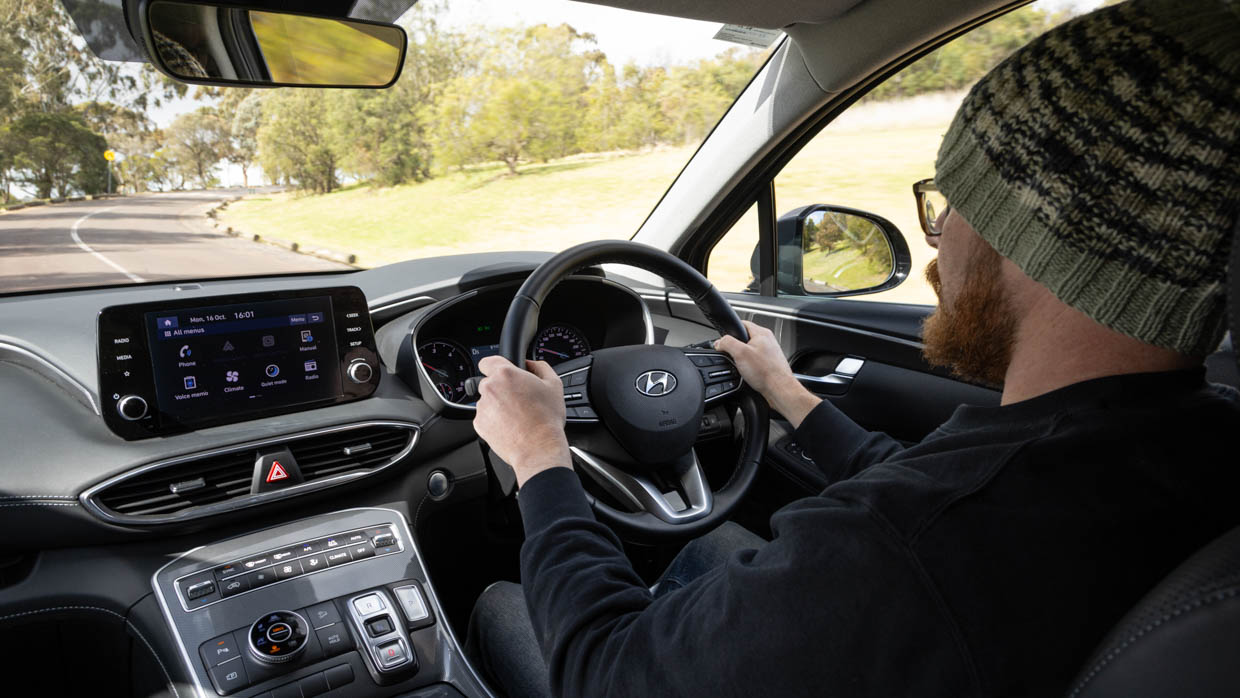
The transmission itself, an eight-speed dual-clutch, works well, but can’t compare to a torque converter equivalent for smoothness and refinement. Compared to rivals, the Santa Fe’s ride quality is also merely okay – almost unusually firm, especially given its 60-profile tyres.
The Santa Fe has pleasant highway manners and is quiet enough. The Santa Fe’s active driver assist systems can be busy keeping the car in the centre of the lane, at one point clinging quite close to the right-hand lane marking. It was a bit hard to trust.
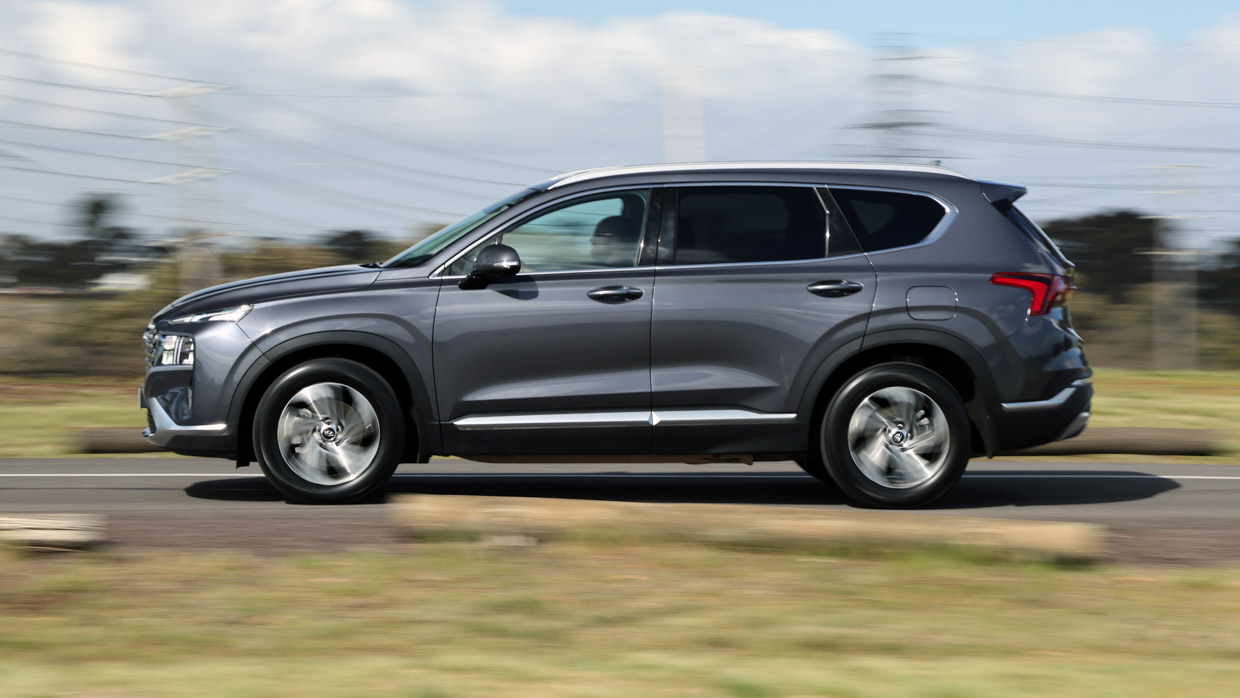
Dynamically the Santa Fe has little to offer the keen driver and punted enthusiastically up a winding road it just feels a bit old and awkward, even in its Sport mode which does little but sharpen the powertrain and throttle response.
The dual-clutch is hardly the last word on responsiveness, even using the paddles. Elsewhere, the chassis is easily shaded by newer competitors for driver appeal, such as the Honda CR-V.
Despite its slightly smaller exterior dimensions, the Santa Fe is big on interior space, with comfortable seating for four adults and a generously sized boot.
The leather on the steering wheel and seats lift ambience a lot compared to the cloth of the base grade and even make it feel a tiny bit posh. Big ticks for the semi-quilted upholstery design on the seats.
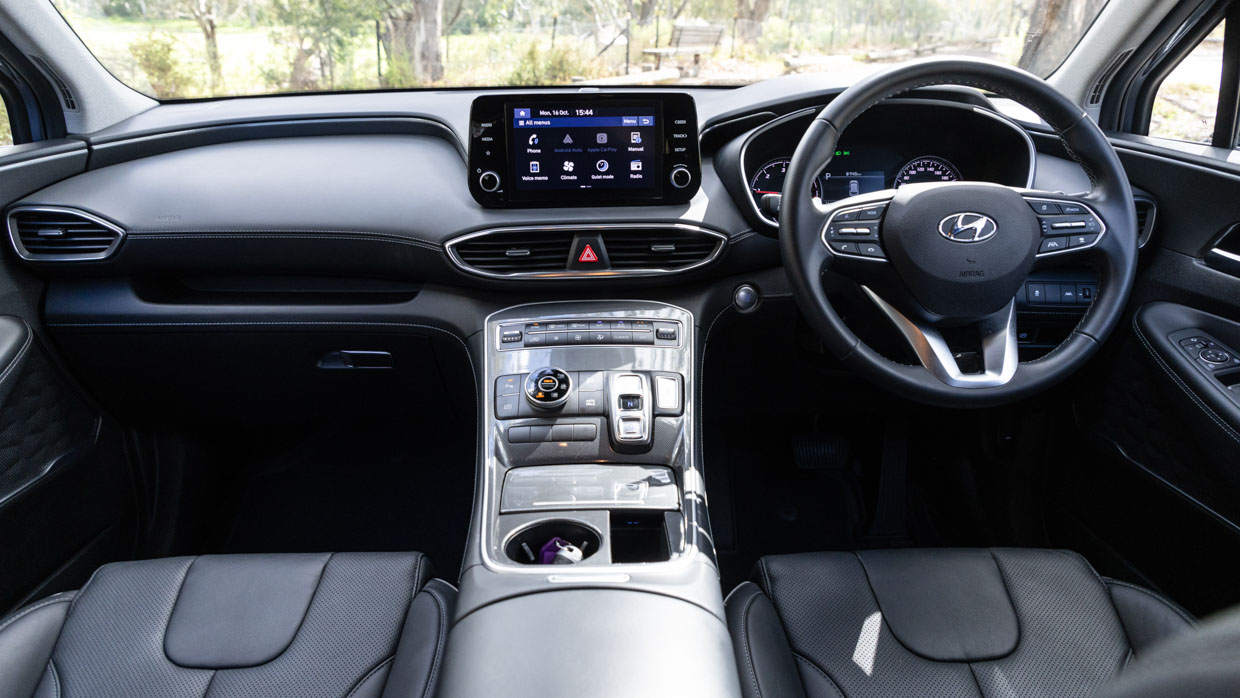
The seats themselves are a bit of a value concession as they’re almost fully manual adjustment. And they are a bit firm, too, with a very pronounced lumbar and little scope to dial it out. The passenger seat also forgoes height adjustment, meaning that some passengers might have the constant feeling like they’re sitting too low.
The standard-fit wireless phone charger is also a bit quirky, a vertical slot you drop your phone into with a trapdoor at the bottom – where things can fall and easily get stuck. To the previous tester looking for their gym card, it’s at the bottom of this Santa Fe’s phone charging slot.
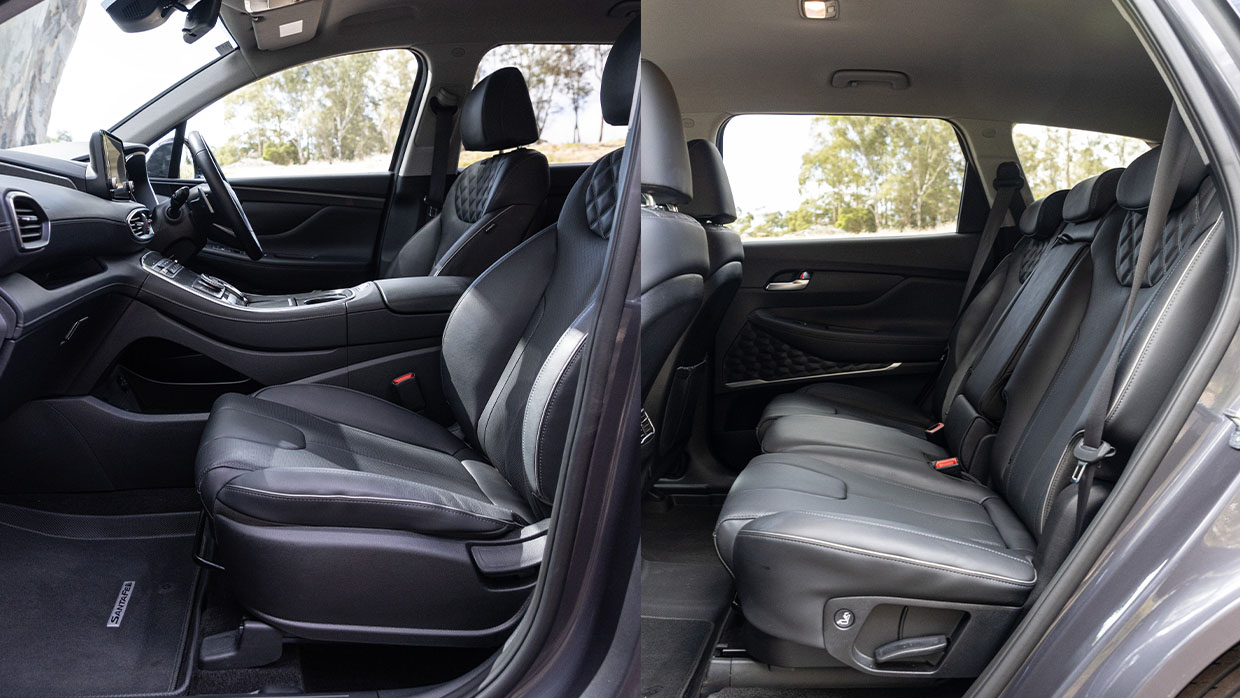
The Santa Fe’s technology offer is a bit behind by 2023 standards. The infotainment screen is a relatively petite 8.0 inches, while the cluster nestles a small, 4.2-inch screen between two analogue dials, making the interior design feel older than it is.
Both Apple CarPlay and Android Auto require a cable, while there’s also no native satellite navigation or DAB+ radio, absent features that do come fitted to the next-grade-up the Elite.
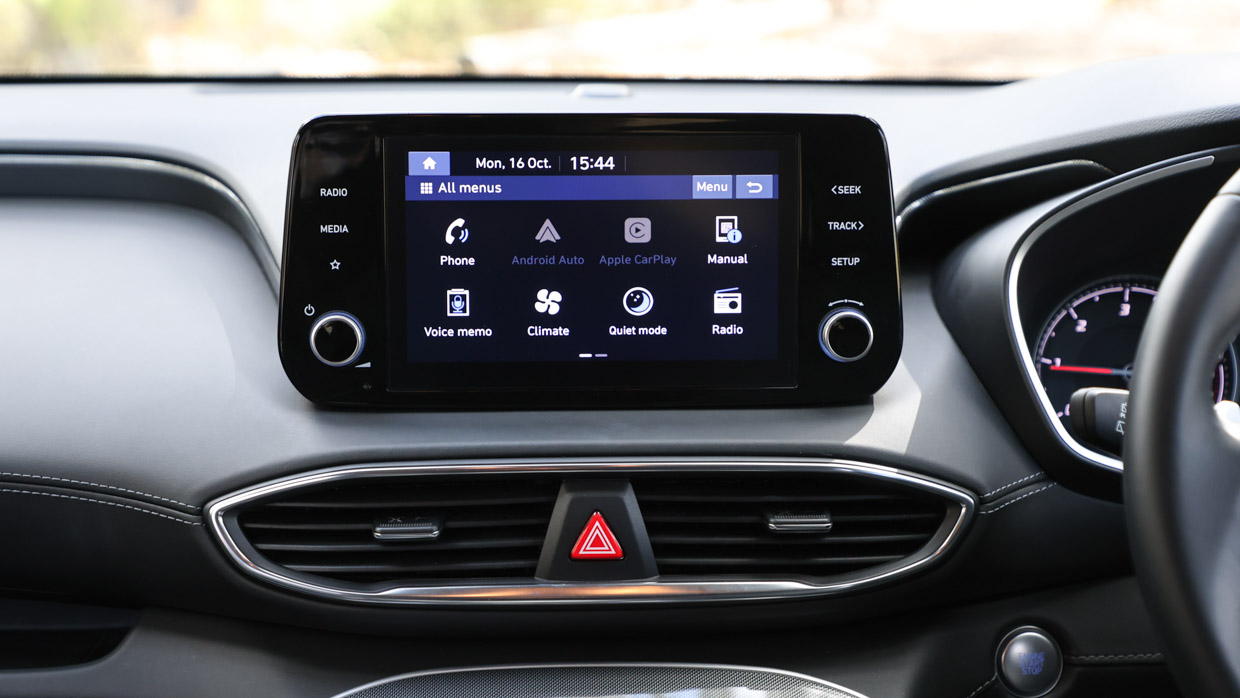
The second-row is roomy, easily accommodating two adults. There’s a centre armrest, two air-vents and two USB-A outlets. For child seats, there are two sets of ISOFIX points and three top tethers.
The third row is very squeezy for adults but would be fine for kids. The second row is also sliding, maximising boot space if you are only using the back seat for kids.
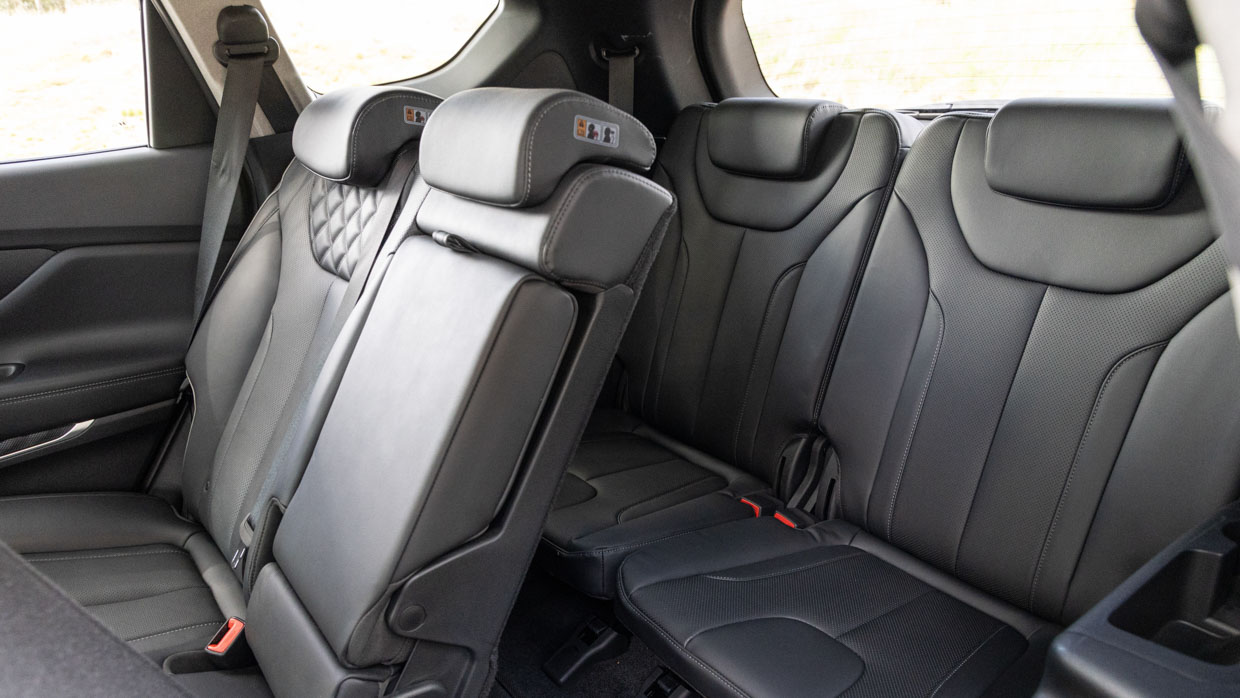
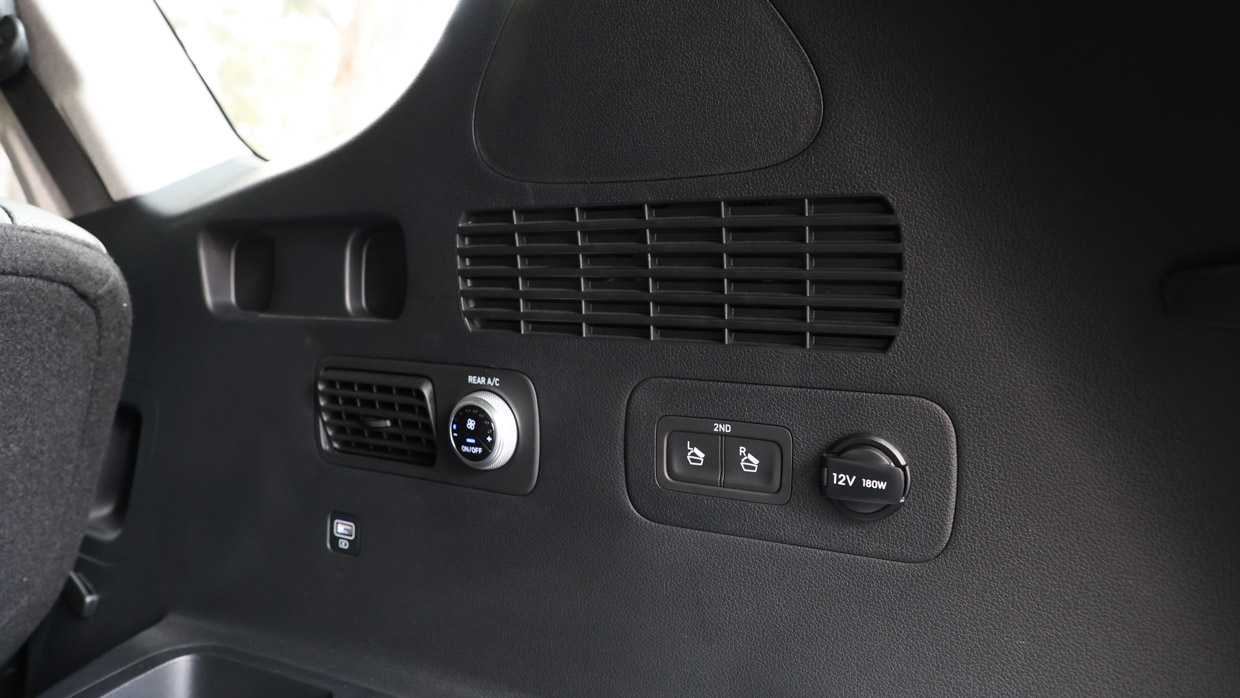
There are great third-row amenities including air vents with adjustable fan speed, two USB-A charging outlets and generous outboard elbow rests with built-in cup holders.
One omission is the lack of third-row top tethers. If you’re buying primarily to carry kids, the seven-seat Kia Sorento has four ISOFIX points to the Santa Fe’s two (including two in the third row); and five top tethers to the Santa Fe’s three.
At 571 litres, the boot is nice and big. Hyundai has done a great job with the packaging, though in seven-seat mode the boot does shrink right down to the bare minimum.
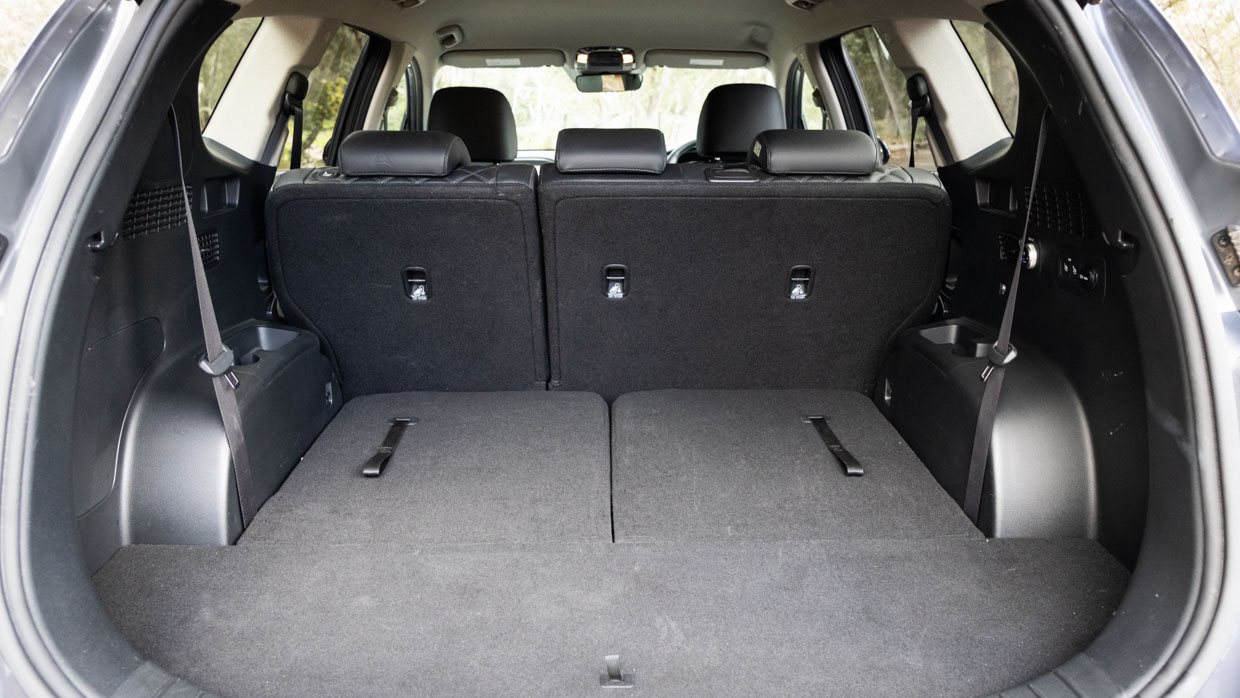
Despite accommodating a third row and a full-size spare wheel, none of it eats too much into boot space. There’s even a deep wet box and built-in stowage for the cargo blind. Handily, there are boot-situated buttons to fold down the second row; and a 12-volt outlet.
Also, there’s a manual tailgate, which in 2023 has become something of a sin for a $53,000 car.
The fourth-generation Santa Fe is a very safe car, scoring five stars in local ANCAP crash-testing in 2018, although the testing has become much stricter since then.
Even still, the Santa Fe comes with a good suite of safety systems, including advanced autonomous emergency braking (AEB) that can detect cyclists and pedestrians, and mitigate impacts from higher interurban speeds. The AEB also has junction turning functionality, a requirement to score five stars in ANCAP testing from 2023.
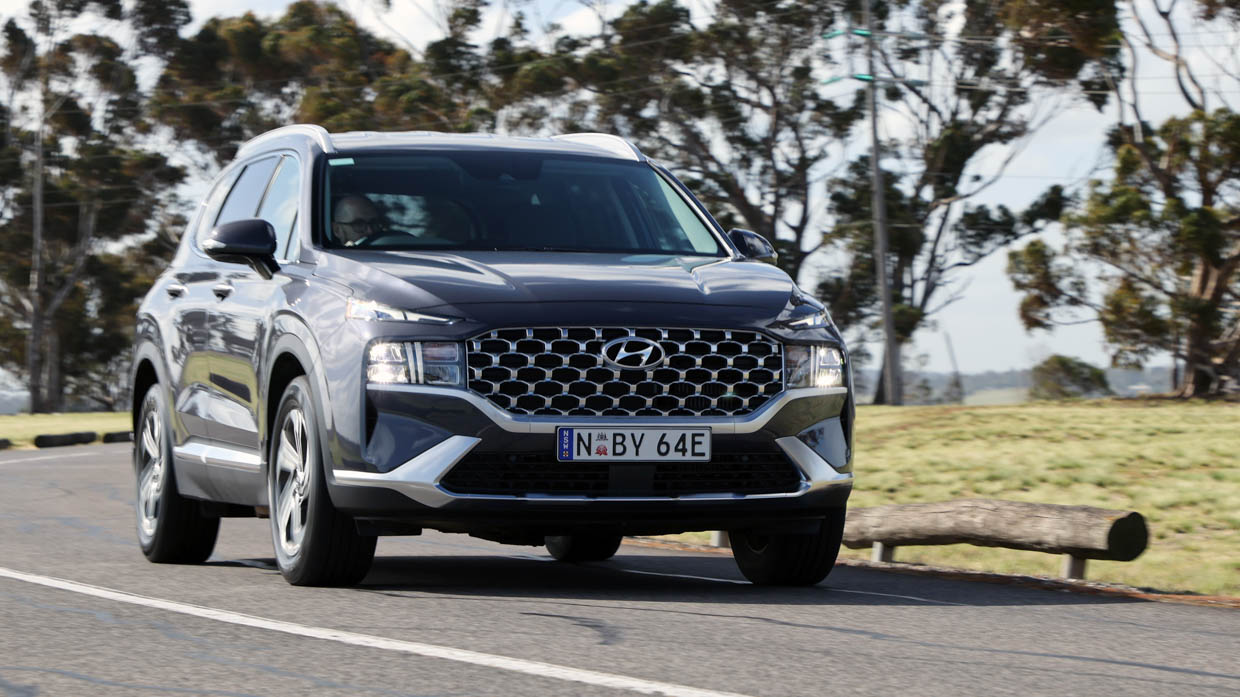
The list of standard safety features includes:
A notable omission is the lack of third-row curtain airbags. For clarity, according to Hyundia, there’s some third-row glass coverage in Santa Fe, though not enough to qualify as head protection – this is reflected in ANCAP’s long-form assessment of the SUV.
Another omission is reverse-AEB, something only available on the top-spec Highlander.
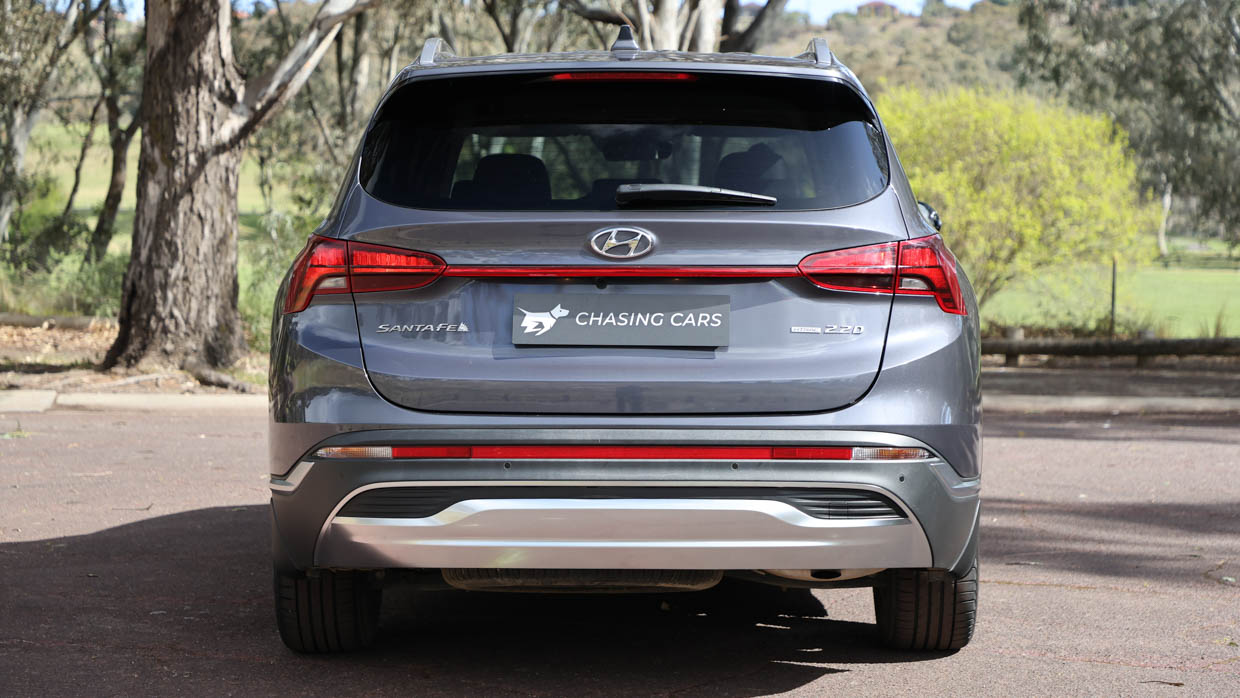
The Highlander is also the only grade to offer the clever blind-spot video view, which flashes up a live feed of your blind-spot in the digital instrument cluster as you hit the indicator. This requires the full 12.3-inch digital instrument cluster of the Highlander.
Something the Active gets over the base model is Safe Exit Assist, which can detect approaching cars or cyclists and prevent the rear doors from opening until the coast is clear. This could stop a child opening a rear door a little too hastily.
For its size, the Santa Fe is exceptionally good on fuel. Expect to see figures as low as 5.7L/100km on the motorway, or around 7.3L/100km in normal everyday driving. With a 67-litre fuel tank, you’ll regularly see ranges of between 800 and 900km, or even more.
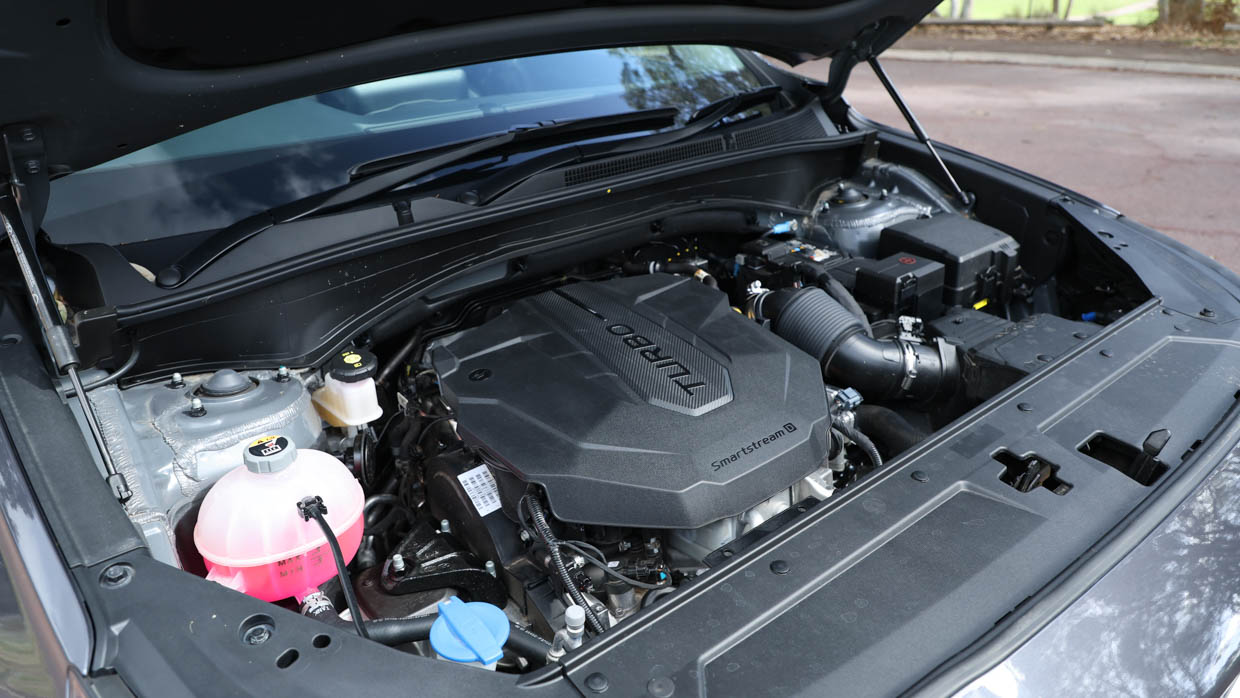
With a five-year servicing cost of $2525, the Santa Fe isn’t as cheap to run as some of its competitors. The new Honda CR-V costs $995 to service over five years, for example, while the Toyota Kluger is $1325. The diesel Kia Sorento is $2427.
Hyundai’s warranty is five years with unlimited kilometres, which is decent and about standard across the industry in 2023, if down on sister Kia’s seven-year coverage.
The Santa Fe is about to be replaced in 2024, meaning that if you want the latest in technology, interior design and driving dynamics, you might be best served waiting for the new one.
But at the same time, it will undoubtedly ask a higher price, and you might be able to nab a deal on the current one, which is still a very good, practical if somewhat no-frills SUV.
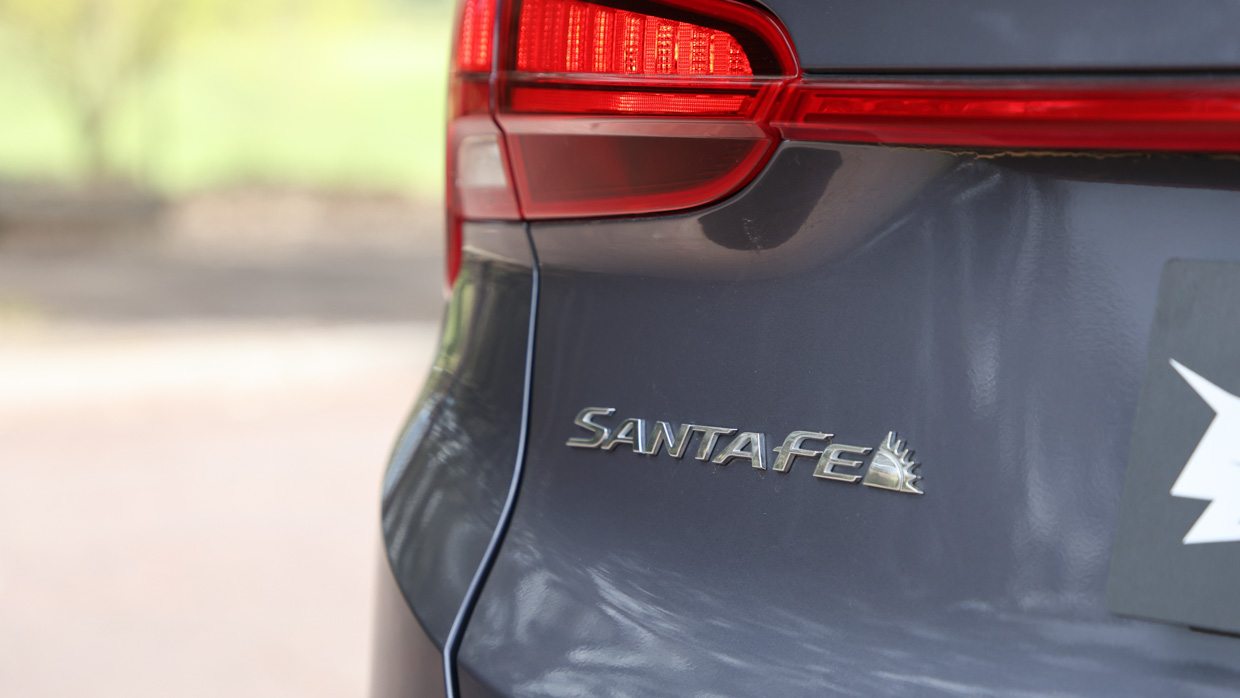
In Active trim, the Santa Fe diesel will appeal to those who want something of an honest, utilitarian SUV and don’t mind the manual seats, a lack of sunroof and a manual tailgate – especially if it means they get to pocket a few grand.
You’d be silly not to consider the excellent Kia Sorento Sport as a cross shop. For the same price, you get the same turbo-diesel 2.2-litre powertrain and all-wheel drive, but in a slightly longer car with a bigger boot, with a roomier back seat and third row.
The Kia alternative also offers two more ISOFIX points and two additional top tethers as well as a bigger 10.25-inch infotainment display, electric 10-way adjustable driver’s seat and native satellite navigation. It also has a better, seven-year warranty.
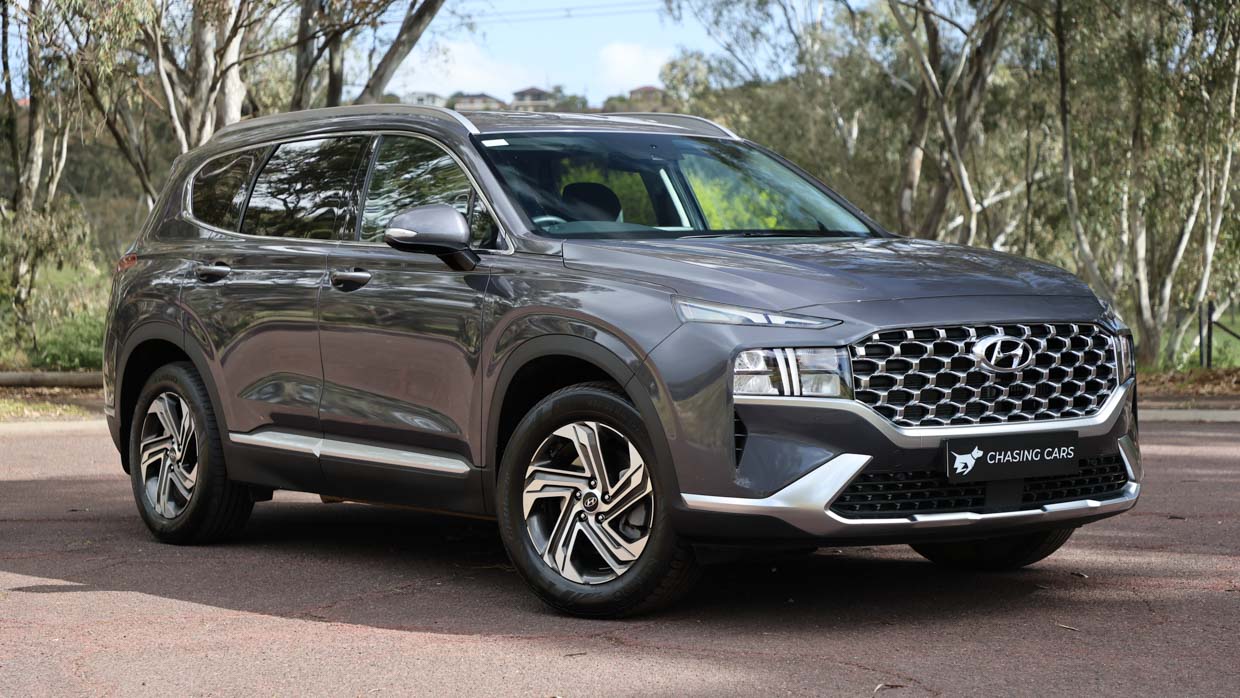
One catch with the Kia over the Hyundai is that you get cloth upholstery, not the nice, leather-appointed trim of the Santa Fe Active, which does make a big difference to the interior vibe.
One area the Sorento can’t match the Santa Fe, however, is on towing.
The Hyundai’s 2500kg braked maximum towing capacity not only eclipses that of the Kia (2000kg) but also the Toyota Kluger (2000kg), so if you’ve got a smaller caravan to haul, that might be the decision made right there and then.
Key specs (as tested)
About Chasing cars
Chasing Cars reviews are 100% independent.
Because we are powered by Budget Direct Insurance, we don’t receive advertising or sales revenue from car manufacturers.
We’re truly independent – giving you Australia’s best car reviews.
The estimate provided does not take into account your personal circumstances but is intended to give a general indication of the cost of insurance, in order to obtain a complete quote, please visit www.budgetdirect.com.au. Estimate includes 15%^ online discount.
^Conditions Apply
Budget Direct Insurance arranged by Auto & General Services Pty Ltd ACN 003 617 909(AGS) AFSL 241 411, for and on behalf of the insurer, Auto & General Insurance Company Limited(ABN 42 111 586 353, AFSL 285 571).Because we don’t know your financial needs, we can’t advise you if this insurance will suit you. You should consider your needs and the Product Disclosure Statement before making a decision to buy insurance. Terms and conditions apply.
Indicative quote based on assumptions including postcode , 40 year old male with no offences, licence suspensions or claims in the last 5 years, a NCD Rating 1 and no younger drivers listed. White car, driven up to 10,000kms a year, unfinanced, with no modifications, factory options and/or non-standard accessories, private use only and garaged at night.
^Online Discounts Terms & Conditions
1. Discounts apply to the premium paid for a new Budget Direct Gold Comprehensive Car Insurance, Third Party Property Only or Third Party Property, Fire & Theft Insurance policy initiated online on or after 29 March 2017. Discounts do not apply to optional Roadside Assistance.
2. Discounts do not apply to any renewal offer of insurance.
3. Discounts only apply to the insurance portion of the premium. Discounts are applied before government charges, taxes, levies and fees, including instalment processing fees (as applicable). The full extent of discounts may therefore be impacted.
4. We reserve the right to change the offer without notice.